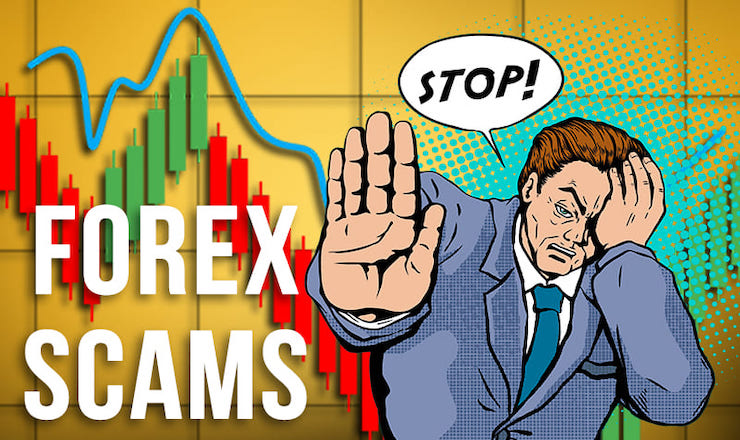Foreign exchange is a legal business that needs to be governed like any other. However, some criminals use the lack of a centralized exchange and commit fraud on merchants. Such scams are easily perpetrated on people who have a basic understanding of FX trading but lack the advanced information.
Forex scammers use unfair and illegal methods to steal traders’ money. They prey on traders of different ages and phases of trading experience, continually exploring new and innovative ways to trick them.
What are Forex Trading Scams?
Forex trading scams target traders who want to use the foreign market. Since this market is legitimate and used for trading multiple currencies, it can be challenging to distinguish between genuine tools, platforms, wallets and forex trading scams.
Trading scams can occur at any time when it comes to Forex; many attacks can be pretty precise and highly sophisticated, making it impossible for anyone with the keenest eyes to identify the dangers. In addition, you’ll probably use various platforms when trading on the Forex markets; these platforms can include features like market access or wallets to keep your assets, making them an essential element of the whole trading process. Unfortunately, not all of the platforms you come across will be trustworthy; these fraudulent platforms pose the most significant risk to your safety and financial security, giving rise to Forex trading scams.
Nine Common Types of Forex Scams

Signal Seller Scams
The signal scams are another variant of forex scams. Here, you must subscribe to receive random signals with a track record quite different from what you saw before your subscription. A 5-year-old can easily Photoshop the con artist’s dishonest track records and profit statements. The market suddenly becomes too unpredictable to forecast when individuals start following this signal provider, and the outcomes are poor. Due to the various risk profiles, periods, and even time zones, providing signals is quite challenging.
Robot scams
FX robots often use some pre-established algorithms to originate and execute transactions. These assist traders in overcoming a few challenges posed by manual trading. While not all bots are frauds, it is best to be careful when selecting an FX bot. By doing this, undesirable scenarios can be avoided. Radical claims that seem too fantastic to be accurate are among the most important in these situations. Trading bots can be helpful, but they cannot bring you the unrealistic returns, ensured by them. Using bots with unauthorized brokers is another example. Even though the performance may appear promising, there may be higher charges and spreads. As a result, they may conclude in passive losses.
Phony trading scams
There appears to be plenty of adverts right now promoting false foreign exchange investments and phony currency trading programmes. In other words, a compelling salesperson or marketing strategy might convince you to invest in a forex fund by leveraging theoretical or probable consequences. These organizations probably won’t ever guarantee the payment. It is merely another scheme to steal your money under the guise of FX trading. Another outcome might even result in opening a real account for you. However, the brokerage won’t be registered. In this case, funds from your budget will likely fade after a few deals. They will probably blame the erratic market. In other words, the brokerage firm may just keep the money.
Assertive forex brokers
Recovering from a cash fraud can be complicated and drawn out for its victims. It is vital to recognize the critical warning signs if you want to avoid being one. Genuine forex traders are not intrusive while promoting their abilities or services to potential clients. To put it another form, it is essential to exercise care if a few forex brokers or businesses contact you repeatedly and you do not know them directly. Ask for advice from people you know if forex trading interests you.
Scams on Instagram and YouTube
You probably have seen profiles that advertise 90% and 95% trade accuracy. But, have you ever wondered why an individual would spend their time trying to sell a trading strategy when they could use it to their benefit and become wealthy? To collect your money, they will use all manner of “proofs” and “reliable” track records, which is the simple answer to their attempt to convince you that it works.
Scams via WhatsApp, email, and SMS
For the sake of professionalism, some con artists want shipping emails. You may have gotten emails with formal signatures informing you that you have been chosen as one of the best investors in their Robo-advisor, which has unlocked the FX market’s mysteries. Of course, you had to wire them money. Simple, yes? Developed automated trading platforms called Robo- advisors for particular market situations. Unfortunately, big-time wasters and con artists are the most accessible, paid robot advisors. We have seen someone advertise one on Twitter for $500 with the words, “I never use Robo-advisors, but attending this one was good; DM me for investment.” It appears that even con artists have become a little lazy.
Limits on withdrawal
It may be time to start fearing about your investment if you are seeking to withdraw money from your account but cannot do so. You should reconsider your investment or, better yet, start before failing more money if a broker responds to this with a gray justification or imprecise apology.
Scam of Guaranteed Returns
Forex scams exist in various shapes and sizes, with guaranteed returns fraud being the simplest and numerous prevalent. Scammers use this one to access other individuals’ money effortlessly. In essence, someone will get in touch with you and claim to have a guaranteed-win method and that he/she wants you to invest your money so that you may become wealthy like the investors who have already worked with him/her. The truth is significantly different from all of this, which you should be aware of. There is no plan, no returns, and, seriously, no honesty.
Promises of Bonuses and Rewards
With margin trading, there is a significant danger of losing money due to the volatility of the forex markets. Because of this, considerable authorities require brokers to post risk disclosures on their websites to alert potential customers to the risks associated with trading forex and CFDs.
A broker should be avoided if they advertise bonuses like a $50 bonus for signing up for an account, risk-free trading, or 80% profits on trading signal purchases.
These promises of rewards are red herrings meant to distract the trader from doing necessary due diligence. Brokers are not allowed to make any such unrealistic offers, according to the most significant authorities.

How to protect yourself from forex scams?
Make sure you first weigh all the benefits and drawbacks. Avoid making any rash decisions. The most crucial step in lowering the risk of fraud is picking a trustworthy FX brokerage. It would be advantageous if you also refrained from considering any claims that sound credible. After reviewing the broker’s rules and consumer feedback, start with a small amount for live trading. By carefully researching and setting aside adequate time, one can avoid such financial fraud in the FX market.
Conclusion:
The Background Affiliation Status Information Center system was introduced as a database, which looks into your broker’s legitimacy. Numerous modifications have eliminated the swindlers, the undesired, and the outdated schemes, and have legitimized the system for multiple reputable businesses. Nevertheless, it would help if you were forever looking out for new forex scams because they are a constant threat to the market, due to the temptation and attraction they cause for enormous earnings.
– As inputs from Gennifer.
